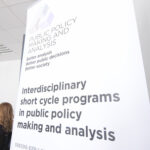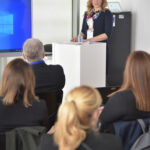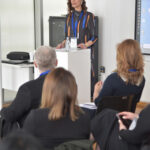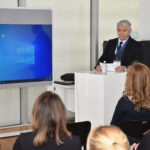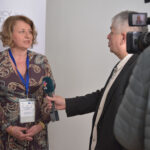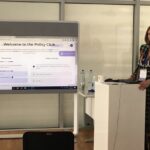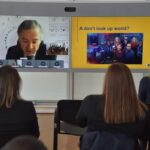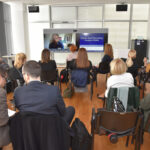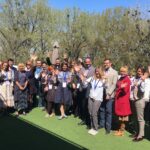NOVI SAD, 11 April, 2022 – Two-day international conference “Science Meets Public Policies”, co-organized by the University of Novi Sad, the Faculty of Sciences of the University of Novi Sad and the Public Policy Secretariat of the Government of Serbia, started today in Novi Sad. During the conference, over 30 participants from 11 countries will present and debate on the ways in which scientific knowledge from various fields can facilitate better understanding of social problems and finding better solutions in policy-making, with special emphasis on the sustainable development, the use of data science methods for the purpose of making informed decisions, and strengthening the link between education and science and public policies.
According to Jasna Atanasijević, the president of the Scientific Committee of the University of Novi Sad, public policy decisions are often very complex and require different areas of knowledge, which direct decision-makers do not necessarily possess. Bad decisions, made contrary to undisputed truths, sooner or later become controversial and contested. “Scientists represent a part of society that nurtures values and competencies, such as critical thinking, objectivity, openness to criticism and knowledge testing. All findings arising from scientific research can directly or indirectly contribute to decision-making, whether private or collective. How progressive and rich our society will be to a large extent depends on the good collective decisions we make. In other words, we progress as much as we, as a society, allow talent and knowledge to drive our decisions. If we keep them out of the decision-making process, we will renounce the part of our progress,” said Mrs Atanasijević.
Dean of the Faculty of Sciences in Novi Sad, Milica Pavkov-Hrvojević, stated that the Faculty of Sciences was an excellent base for the realization of this project, which made a step forward towards the communication between science and public policy. “I think this is just the first step in establishing a good relationship between these two areas. Lifelong learning courses in the field of public policies have been created at the Faculty of Sciences, and have been jointly implemented by the professors from our faculty and the employees of the Secretariat for Public Policies under the Government of Serbia. We have shown that the Faculty of Science is an interdisciplinary faculty, with 5 departments under one roof, which nurtures sciences and disciplines such as data science, biology, chemistry, environmental protection, physics, as well as social sciences such as demography and economics,” said Mrs Pavkov-Hrvojević.
Sanja Mešanović, Deputy Director of the Republic Secretariat for Public Policies of Serbia, emphasized that responsible decision-making – based on evidence and scientific results – is a prerequisite for the successful functioning of a modern society. “The application of scientific findings in the public policy creation results in better decisions and measures that are in line with the challenges of the modern society. Our common goal is to enable the interaction between the state administration and the scientific community and to use more scientific achievements in policy making. In doing so, it is important that scientists are well informed about the priority issues that the state administration faces with,” said Mrs Mešanović.
Dejan Madić, Rector of the University of Novi Sad, said that through such programs, the University of Novi Sad gets the opportunity to present its capacities to the public and thus fulfil its role in society and contribute to the dialogue between the scientific community and public policy makers. “The University of Novi Sad has an excellent position, and that is to have two authorities interested in science, namely the provincial government and the Secretariat for Higher Education and Scientific and Technological Development, on one side, and the Republic Government and the Ministry of Education, on the other side,” said Mr Madić.
The conference “Science Meets Public Policies”, the first of its kind in Serbia, is held under the Erasmus+ project Public Policy Making and Analysis (PPMA), within which the lifelong learning programs in public policy analysis have been developed. “We are almost at the end of this project, but on the other hand, we are also at the beginning of a new journey, and that is connecting science and politics in Serbia and, hopefully, throughout this part of Europe. The first step in achieving this ambitious goal is to start creating a network of individuals and scientists from different disciplines who are interested in public topics and who share common values in terms of the importance of knowledge as a basis for good public decisions,” said Jasna Atanasijević, talking about Erasmus+ KA2 PPMA project, whose results so far include:
- 3 halls at 3 universities in Serbia (Novi Sad, Belgrade, Niš) have neeb equipped with modern telepresence system that allows conferences, lectures and events held in a hybrid format to reach a much larger audience than the one physically present.
- Nearly 50 professors and other teaching staff have been trained to teach public policies at EU partner institutions (Leiden University in the Netherlands, King’s College London, Paris-Est Creteil University, 27th Region – Paris NGO)
- 22 courses in public policy have been developed and implemented at 3 universities in Serbia, each of which is available individually and through 5 different lifelong learning programs. In that way, about 150 participants have been educated, and this number will increase, because the program courses remain available.
- 9 textbooks have been published, of which 7 translations of internationally recognized textbooks for teaching public policy
- Web platform Policy club has been developed, intended for networking practitioners in the field of public policy analysis, which also serves as a public repository of public policy analysis.
Science meets policy conference april 2022 program

